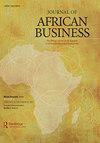Does ICTs Usage Facilitate Access to Market? An Empirical Evidence of Market Gardeners in Benin
IF 1.8
Q3 BUSINESS
引用次数: 0
Abstract
ABSTRACTImperfect information is a major obstacle for agricultural businesses in developing countries. The resulting information asymmetry increases transaction costs and affects the behavior of market stakeholders. In Benin, market gardeners’ participation is limited by geographical isolation and poor communication and transport infrastructures. Information and communication technologies (ICTs) now offer a fast and less costly means of accessing and disseminating information for more active market participation. The aim of this article is to measure the contribution of ICTs to market participation by testing whether they improve participation. Using a recursive bivariate probit model, our results indicate that market gardeners who use ICT to access information have a higher frequency of market participation than those who do not. Cell phones, radios, and televisions lead to a 35.3%, 25.6% and 8% higher probability of market participation respectively than those who don’t use them. These results suggest that a platform for disseminating knowledge via ICT could be set up to increase market participation.KEYWORDS: AgricultureICTmarket participationtransaction costslBenin Disclosure statementNo potential conflict of interest was reported by the author(s).信息通信技术的使用是否有助于市场准入?贝宁市场园丁的实证研究
摘要信息不完善是发展中国家农业企业面临的主要障碍。由此产生的信息不对称增加了交易成本,影响了市场利益相关者的行为。在贝宁,由于地理位置偏僻以及通讯和运输基础设施落后,市场园丁的参与受到限制。信息和通信技术(ict)现在提供了一种获取和传播信息的快速和成本较低的手段,以促进更积极的市场参与。本文的目的是通过测试信息通信技术是否改善了市场参与,来衡量信息通信技术对市场参与的贡献。使用递归双变量概率模型,我们的研究结果表明,使用信息通信技术获取信息的市场园丁比不使用信息通信技术的市场园丁有更高的市场参与频率。与不使用手机、收音机和电视的人相比,他们参与市场的可能性分别高出35.3%、25.6%和8%。这些结果表明,可以建立一个通过信息通信技术传播知识的平台,以提高市场参与。关键词:农业信息通信技术市场参与交易成本贝宁披露声明作者未报告潜在的利益冲突。
本文章由计算机程序翻译,如有差异,请以英文原文为准。
求助全文
约1分钟内获得全文
求助全文
来源期刊

Journal of African Business
BUSINESS-
CiteScore
4.60
自引率
10.50%
发文量
36
期刊介绍:
Journal of African Business is the official journal of the Academy of African Business and Development, the largest network of professionals committed to advancement of business development in African nations. JAB strives to comprehensively cover all business disciplines by publishing high quality analytical, conceptual, and empirical articles that demonstrate a substantial contribution to the broad domain of African business. Regardless of the research context, tradition, approach, or philosophy, manuscripts submitted to JAB must demonstrate that the topics investigated are important to the understanding of business practices and the advancement of business knowledge in or with Africa. Particularly, JAB welcomes qualitative and quantitative research papers. JAB is not, however, limited to African-based empirical studies. It searches for various contributions, including those based on countries outside Africa that address issues relevant to African business. Targeted toward academics, policymakers, consultants, and executives, JAB features the latest theoretical developments and cutting-edge research that challenge established beliefs and paradigms and offer alternative ways to cope with the endless change in the business world. Covered areas: Accounting; Agribusiness Management and Policy; Business Law; Economics and Development Policy; Entrepreneurship and Family Business; Finance; Global Business; Human Resource Management; Information and Communications Technology (ICT); Labor Relations; Marketing; Management Information Systems (MIS); Non-Profit Management; Operations and Supply Chain Management; Organizational Behavior and Theory; Organizational Development; Service Management; Small Business Management; Social Responsibility and Ethics; Strategic Management Policy; Technology and Innovation Management; Tourism and Hospitality Management; Transportation and Logistics
 求助内容:
求助内容: 应助结果提醒方式:
应助结果提醒方式:


